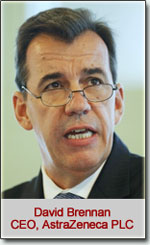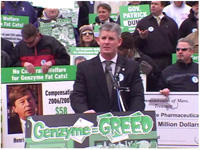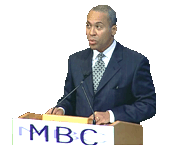AstraZeneca = Greed
AstraZeneca PLC
15 Stanhope Gate
London, W1K 1LN
United Kingdom
Phone: 44 20 7304 5000
www.astrazeneca.com
Chief executive: David Brennan
Non-Executive Chairman: Louis Schweitzer
Full-time Employees: 67,400
2009 Revenue: $32.8 Billion
2009 Net Income: $7.5 Billion
U.S. headquarters:
AstraZeneca Pharmaceuticals
1800 Concord Pike
Wilmington, DE 19850-5437
302-886-3000
www.astrazeneca-us.com

David Brennan:
Chief Executive Officer
2007 total Remuneration from AstraZeneca: $4.7 million
Because it is based abroad, AstraZeneca does not provide the same level of detail on executive compensation as U.S. companies.
He is a Member of the Executive Board of the Pharmaceutical Research and Manufacturers of America (PhRMA) and a Member of the Executive Board of the European Federation of Pharmaceutical Industries and Associations (EFPIA). In December 2007 David was appointed a Commissioner of the UK Commission for Employment and Skills.
Board of Directors
Louis Schweitzer
Non-Executive Chairman
Appointed as a Director 11 March 2004. Non-Executive Chairman of Renault SA. Non-Executive Director of BNP-Paribas, Electricite de France, Veolia Environnement, Volvo AB and L'Oreal. Vice- Chairman of the Supervisory Board of Philips Electronics NV.
Bo Angelin
Non-Executive Director
Appointed as a Director 24 July 2007. Professor of Clinical Metabolism at Karolinska Institutet and Head of the Department of Endocrinology, Metabolism and Diabetes at the Karolinska University Hospital in Stockholm, Sweden.
David Brennan
See above.
John Buchanan
Non-Executive Director
Appointed as a Director 25 April 2002. Senior Independent Director of BHP Billiton Plc. Deputy Chairman of Vodafone Group Plc. Chairman of Smith & Nephew plc.
Jean-Philippe Courtois
Non-Executive Director
Jean-Philippe Courtois is President of Microsoft International and a Senior Vice-President of Microsoft Corporation.
Michele Hooper
Senior Non-Executive Director
Director, Public Corporate Director of UnitedHealth Group. Non-Executive Director of PPG Industries, Inc. Non-Executive Director of Warner Music Group, Inc
Simon Lowth
Executive Director
Simon Lowth joined AstraZeneca as an Executive Director and Chief Financial Officer in November 2007.
Jane Henney
Non-Executive Director
Currently Professor of Medicine, University of Cincinnati. Non-Executive Director of AmerisourceBergen Corporation and CIGNA Corporation. Other board appointments include The Commonwealth Fund and China Medical Board.
Hakan Mogren
Non-Executive Deputy Chairman
Director. Member of the Board of Directors of Investor AB and Groupe Danone. Director of the Marianne and Marcus Wallenberg Foundation.
John Patterson CBE FRCP
Leaving Astrazeneca in March 2009
John is Vice-Chairman of the British Pharma Group and a non-Executive Director of Cobham plc. He is a Fellow of the Academy of Medical Sciences.
Dame Nancy Rothwell
Non-Executive Director
MRC Research Professor and Deputy President and Deputy Vice Chancellor at the University of Manchester.
John Varley
Non-Executive Director
Director, Executive Director of Barclays Bank plc and Barclays plc
Marcus Wallenberg
Director, Chairman of Skandinaviska Enskilda Banken AB. Chairman of Saab AB. Vice-Chairman of Telefonaktiebolaget LM Ericsson. Chairman of the Board of Electrolux AB. Non-Executive Director of Stora Enso Oyj and the Knut and Alice Wallenberg Foundation. Chairman of International Chamber of Commerce (ICC).
Board Compensation
(from Company's 2008 Annual Report)
Director |
Compensation |
|
Louis Schweitzer |
$567,000 | |
Bo Angelin |
$118,000 | |
John Buchanan |
$180,000 | |
Jean-Philippe Courtois |
$109,000 | (Joined the Board in February 2008) |
Jane Henney |
$142,000 | |
Michele Hooper |
$169,000 | |
Rudy Markham |
$43,000 | (Joined the Board in September 2008) |
Hakan Mogren |
$187,000 | |
Nancy Rothwell |
$150,000 | |
John Varley |
$155,000 | |
Marcus Wallenberg |
$99,000 | |
Sensitive Issues
Medicare and Medicaid Fraud
In 2003 AstraZeneca pleaded guilty to a felony conspiracy charge that it helped defraud the federal Medicare program and agreed to pay $355 million in criminal fines and a civil settlement. The company had been charged with giving urologists free samples of an expensive prostate-cancer drug knowing they would bill Medicare and pocket those fees.
In 2007 a federal judge in Boston ruled that AstraZeneca as well as Bristol-Myers Squibb and Schering-Plough had to pay damages for overcharging on certain drugs paid for by Medicare and employee benefit plans. The judge found that AstraZeneca acted "unfairly and deceptively" by causing the publication of false and inflated average wholesale prices for its prostate cancer drug Zoladex.
In 2008, the company was ordered to pay $160 million in damages to Alabama's Medicaid Agency for fraudulently overcharging for drugs for the poor and elderly.
Corrupting Influence of 'Consulting Fees'
The New York Times in 2008 exposed the corrupting influence of drug companies' "consulting fees," which some researchers grossly understate or fail to disclose to their universities as they are required to. A prime example was a University of Cincinnati professor who told school officials that she earned about $100,000 from eight drug firms in 2005-7, when "AstraZeneca actually paid her $238,000."
Product Liability
In the U.S. and Canada, AstraZeneca's controversial anti-psychotic drug Seroquel has been the subject of numerous class-action and personal injury lawsuits alleging that it caused people to develop diabetes.
Overtime compensation
AstraZeneca has been sued in California, Pennsylvania and New York by pharmaceutical sales specialists employed by the company who claim they were improperly denied overtime compensation.
Subsidies
After the Swedish drug company Astra and the British drug company Zeneca merged in 1999 to form AstraZeneca, the corporation chose to locate its North American headquarters in Delaware. The state provided an immediate $18.7 million package of land and cash grants. The company also became eligible for an estimated $30 million in tax credits. In addition, the state committed to spending $79 million in road improvements in the area of the new headquarters.
Below are excerpts from news articles highlighting troubling issues with the company. See for yourself, and draw your own conclusions.
Criminally Defrauding Medicare & Medicaid:
In 2003, AstraZeneca pleaded guilty to a felony charge of conspiracy to defraud the Medicare program and agreed to pay $355 million in criminal fines. The company was charged with giving doctors free samples of a costly cancer drug knowing they would bill Medicare and pocket those fees.
AstraZeneca settles Medicare case
By Matt Andrejczak
CBS.MarketWatch.com / June 20, 2003
http://www.marketwatch.com/news/story/astrazeneca-pays-355-million-settle
/story.aspx?guid=%7B071F517A-9B5F-4D43-A0AE-1DF9BC3B9EAC%7D
In 2007, a federal judge in Boston ordered AstraZeneca and two other firms to pay damages for overcharging on drugs paid for by Medicare and employee benefit plans. The judge said the companies acted "unfairly and deceptively" by falsifying wholesale prices.
3 Drug Makers Are Convicted in Reimbursement Overcharges
By Bloomberg News / June 22, 2007
http://www.nytimes.com/2007/06/22/business/22Drug.html?fta=y
"An Alabama judge upheld the fraud verdict that the state won against AstraZeneca Pharmaceuticals LP in a Medicaid drug pricing suit, but ruled the punitive damages were too high, trimming the total judgment to $160 million. The jury ordered the company, the U.S. subsidiary of Britain's AstraZeneca PLC, to pay $40 million in compensatory damages and $175 million in punitive damages. But Circuit Judge Charles Price ruled that state law limits punitive damages to three times compensatory damages and cut the amount down to $120 million. . . . In his eight-page ruling, Price said the evidence during the trial showed that AstraZeneca's actions in overcharging Alabama's Medicaid program were 'reprehensible.' 'The state introduced evidence to establish that the defendants fraudulently diverted Medicaid funds intended to benefit the state's poor, elderly and infirm citizens,' Price wrote. 'The state established that defendants' wrongful conduct deprived the state of limited funds available for the state's Medicaid recipients.'"
Alabama Judge Upholds Fraud Verdict against AstraZeneca, Trims Judgment
By Bob Johnson
Insurance Journal June 24, 2008
http://www.insurancejournal.com/news/southeast/2008/06/24/91221.htm?print=1
Concealed Payments to Medical Researchers:
The New York Times in 2008 exposed the corrupting influence of drug companies' "consulting fees," which some researchers grossly understate or fail to disclose to their universities as they are required to. A prime example was a University of Cincinnati professor who told school officials that she earned about $100,000 from eight drug firms in 2005-7, when "AstraZeneca actually paid her $238,000."
Psychiatric Group Faces Scrutiny Over Drug Industry Ties
By Benedict Carey and Gardiner Harris
New York Times / July 12, 2008
http://www.nytimes.com/2008/07/12/washington/12psych.html?sq
=consulting%20fees%20cincinnati%20astrazeneca&st=cse&scp=1&pagewanted=print
Evidence of Increased Risk of Diabetes from AstraZeneca Drug:
In the U.S. and Canada, AstraZeneca's controversial anti-psychotic drug Seroquel has been the subject of about 9000 class-action and personal injury lawsuits alleging that it caused people to develop diabetes. A research study found an almost 400% increased risk of diabetes from Seroquel as compared to other comparable medications. In legal proceedings related to this matter, it has been suggested that the FDA has asked AstraZeneca to highlight on Seroquel warning lablels the possibility for significant weight gain --the factor that increases diabetes risk, but AstraZeneca would not acknowledge whether this is the case.
In the Money, and in Court
By Alex Berenson
New York Times / April 22, 2006
http://www.nytimes.com/2006/04/22/business/22plaintiffs.html?pagewanted=all
&
AstraZeneca Drug Raises Diabetes Risk, Doctor Says
By Sophia Pearson and Doris Bloodsworth
Bloomberg News / Jan. 16, 2009
http://www.bloomberg.com/apps/news?pid=20601085&sid=av_Gg66oOeWA&refer=europe
&
AstraZeneca Is Asked to Expand Warning, Lawyer Says
By Margaret Cronin Fisk and Jef Feeley
Bloomberg / Jan. 27, 2009
http://www.bloomberg.com/apps/news?pid=20601087&sid=a8uwQ1qo0GLc&refer=home
Promotion of Unapproved Use of Seroquel:
In 2008, the FDA issued a warning letter to AstraZeneca, stating that the FDA had become aware of oral and written statements that "recommended or suggested a use for Seroquel and Seroquel XR that has not been approved by the FDA, and thus created a new 'intended use' for Seroquel and Seroquel XR for which the products lack adequate directions."
While Seroquel had been approved by the FDA to treat bipolar disorder and schizophrenia, the drug had not been approved for major depressive disorder.
FDA Letter
http://www.fda.gov/cder/warn/2008/Seroquel_Ltr.pdf
AstraZeneca Subverts Integrity of Nobel prize in Medicine?
"The integrity of the Nobel prize was called into question … after it emerged that a member of the jury also sat on the board of a pharmaceuticals giant that benefited from the award of this year's prize for medicine.
Prosecutors were studying whether AstraZeneca, the London-based multi-national pharmaceutical company, could have exerted undue influence on the award.
The joint winner of this year's Nobel Prize for Medicine, Harald zur Hausen, was recognised for his work on the human papilloma virus (HPV), which can lead to cervical cancer. AstraZeneca has a stake in two lucrative vaccines against the virus.
Two senior figures in the process that chose Mr zur Hausen have strong links with the pharmaceutical company, which has also recently begun sponsoring the Nobel website and pro-motional subsidiary. The company strongly denies any wrongdoing. …
Other members of the Nobel Foundation are said to be gravely concerned that the reputation of an organisation that honours the highest achievements in human endeavour is under threat from companies and nations hungry for Nobel glory.
Further concerns were raised by Swedish radio, which revealed that Bertil Fredholm, the chairman of the five-strong committee that assesses Nobel candidates, was a paid consultant for AstraZeneca in 2006."
AstraZeneca row as corruption claims engulf Nobel prize
by David Charter
The Times (UK) / December 19, 2008
http://www.timesonline.co.uk/tol/news/world/europe/article5367941.ece
Drug Maker's E-Mail Released in Seroquel Lawsuit
By DUFF WILSON
New York Times / February 27, 2009
http://www.nytimes.com/2009/02/28/business/28drug.html?ref=business
AstraZeneca "buried" unfavorable studies of its $4.4 billion blockbuster psychiatric drug Seroquel, according to internal documents released Friday in a legal dispute between the company and lawyers for thousands of people who sued the company because they said the drug caused diabetes and weight gain.
AstraZeneca Sharpens Focus on Ethics
By JEANNE WHALEN
The Wall Street Journal / December 23, 2009
http://online.wsj.com/article/SB10001424052748704157304574611724066010600.html
"AstraZeneca in September reached a preliminary agreement to pay $520 million to settle a U.S. investigation into its marketing of the schizophrenia drug Seroquel, including allegations that the company promoted the drug for uses for which it isn't approved by the Food and Drug Administration. This practice, called "off-label marketing," is illegal…
"Controversy has long dogged Seroquel. AstraZeneca is facing thousands of lawsuits filed by patients who allege that Seroquel caused them to develop health problems including diabetes."







